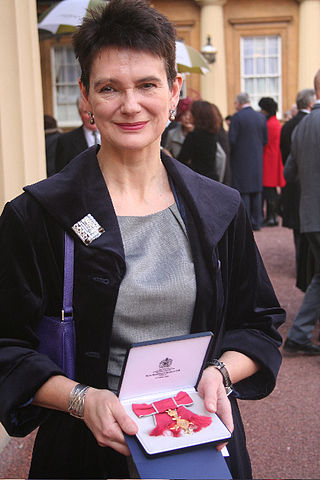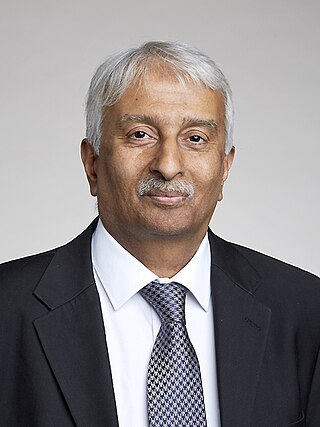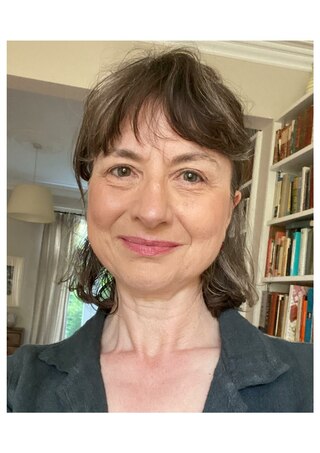This article needs additional citations for verification .(June 2024) |
Nuala Zahedieh | |
|---|---|
| Born | |
| Nationality | British |
| Occupation | University Professor |
Nuala Zahedieh is a British historian and university professor.
This article needs additional citations for verification .(June 2024) |
Nuala Zahedieh | |
|---|---|
| Born | |
| Nationality | British |
| Occupation | University Professor |
Nuala Zahedieh is a British historian and university professor.
She completed her undergraduate degree, a master's degree, and a PhD in Economic History at the London School of Economics. [1]
She was a professor of Economic and Social History at the University of Edinburgh from 1990 to 2021. She retired from that post in 2021. [2]
She served as Director of the Scottish Centre for Diaspora Studies from 2014 to 2019 and Director of the Edinburgh Centre for Global History from 2019 to 2020. She held a Leverhulme Research Fellowship in 1997-8 and has been a Visiting Fellow at the Massachusetts Historical Society. [2]
She is a Fellow of the Academy of Social Sciences; Fellow of the Royal Historical Society, and Fellow of Academia Europaea. [3]
Zahedieh is also on the Academic Panel of the Museum of London and is Chair of the Publications Committee of the Economic History Society. [3]
Her notable books include: [4] [5] [6]
Her book Capital and the Colonies was reviewed positively by Thomas M. Truxes due to the way it handled the historical relationship between London's economy and the Atlantic slave trade. [7]

Andrew Michael Spence is a Canadian-American economist and Nobel laureate.

Dame Diane Coyle is a British economist. Since March 2018, she has been the Bennett Professor of Public Policy at the University of Cambridge, co-directing the Bennett Institute.

Slavery in Britain existed before the Roman occupation and endured until the 11th century, when the Norman conquest of England resulted in the gradual merger of the pre-conquest institution of slavery into serfdom. Given the widespread socio-political changes, all slaves were no longer recognised separately in English law or custom. By the middle of the 12th century, the institution of slavery as it had existed prior to the Norman conquest had fully disappeared, but other forms of unfree servitude continued for some centuries.

Sir Roderick Castle Floud FBA is a British economic historian and a leader in the field of anthropometric history. He has been provost of the London Guildhall University, vice-chancellor and president of the London Metropolitan University, acting dean of the School of Advanced Study at the University of London, and provost of Gresham College (2008–2014). He is the son of Bernard Floud MP.

Peter Mathias, was a British economic historian and the former Chichele Professor of Economic History at the University of Oxford. His research focused on the history of industry, business, and technology, both in Britain and Europe. He is most well known for his publication of The First Industrial Nation: an Economic History of Britain 1700–1914 (1969), which discussed not only the multiple factors that made industrialisation possible, but also how it was sustained.
Ian Steedman was for many years a professor of economics at the University of Manchester before moving down the road to Manchester Metropolitan University. He retired from there at the end of 2006, but was appointed as an emeritus professor.
James Russell Raven LittD FBA FSA is a British scholar specializing in the history of the book. His published works include The English Novel 1770–1829 (2000), The Business of Books (2007), and What is the History of the Book? (2018). As of 2019, he was Professor Emeritus of history at the University of Essex.
Raymond Alan Dixon FRS is a British microbiologist at the John Innes Centre, Norwich, specialising on the molecular understanding of biological nitrogen fixation in bacteria. He was educated at the University of Reading and the University of Sussex.

Sarah (Sally) Lois Price is Professor of Physical Chemistry at University College London.
Deborah Janet Howard, is a British art historian and academic. Her principal research interests are the art and architecture of Venice and the Veneto; the relationship between Italy and the Eastern Mediterranean, and music and architecture in the Renaissance. She is Professor Emerita of Architectural History in the Faculty of Architecture and History of Art, University of Cambridge and a Fellow of St John's College, Cambridge.

Vengalil Krishna Kumar Chatterjee is a British endocrinologist. He is a professor of endocrinology in the Department of Medicine at the University of Cambridge and a fellow of Churchill College, Cambridge. He is also the director of the Cambridge Clinical Research Centre, part of the National Institute for Health Research (NIHR).
Angela Gweneth Woollacott is an Australian historian who has contributed to the history of the British Empire and Australia. She has written many books and journal articles, as well as a series of Australian history textbooks, served on the editorial boards for Journal of Women's History, Journal of British Studies, and Lilith: A Feminist History Journal, and served on the international advisory board for Settler Colonial Studies. She is a past president of the Australian Historical Association.

Valerie Gibson, also known as Val Gibson, is an Emeritus Professor of Physics and former Head of the High Energy Physics group of the Cavendish Laboratory at the University of Cambridge.

Emily Joanna Gowers, is a British classical scholar. She is Professor of Latin Literature at the University of Cambridge and a Fellow of St John's College, Cambridge. She is an expert on Horace, Augustan literature, and the history of food in the Roman world.
Alexandra Shepard is Professor of Gender History at the University of Glasgow. In 2018 Shepard was elected a Fellow of the British Academy in recognition for her work in gender history and the social history of early modern Britain. In 2019 she was elected a Fellow of the Royal Society of Edinburgh.
Capitalism and Slavery is the published version of the doctoral dissertation of Eric Williams, who was the first Prime Minister of Trinidad and Tobago in 1962. It advances a number of theses on the impact of economic factors on the decline of slavery, specifically the Atlantic slave trade and slavery in the British West Indies, from the second half of the 18th century. It also makes criticisms of the historiography of the British Empire of the period: in particular on the use of the Slavery Abolition Act of 1833 as a sort of moral pivot; but also directed against a historical school that saw the imperial constitutional history as a constant advance through legislation. It uses polemical asides for some personal attacks, notably on the Oxford historian Reginald Coupland. Seymour Drescher, a prominent critic among historians of some of the theses put forward in Capitalism and Slavery by Williams, wrote in 1987: "If one criterion of a classic is its ability to reorient our most basic way of viewing an object or a concept, Eric Williams's study supremely passes that test."
George William Daniels was a British political economist and historian who was vice-president of the Chetham Society and President of the Manchester Statistical Society.
M. Claire Cross is a British historian and professor emeritus in history at the University of York. She was president of the Ecclesiastical History Society from 1989 to 1990.

The first Leith Sugar House was established in 1677 by Robert Douglas and partners. Between 1667 and 1701 four sugar boiling and rum-distilling enterprises were established in Scotland, three in Glasgow and one in Leith. The financial success of the Leith Sugar house in the seventeenth and eighteenth century demonstrates Edinburgh's economic connection to the Atlantic economy and enslaved labour.
Julian Hoppit FBA is an English historian, specializing in the early modern economic and political history of Britain.